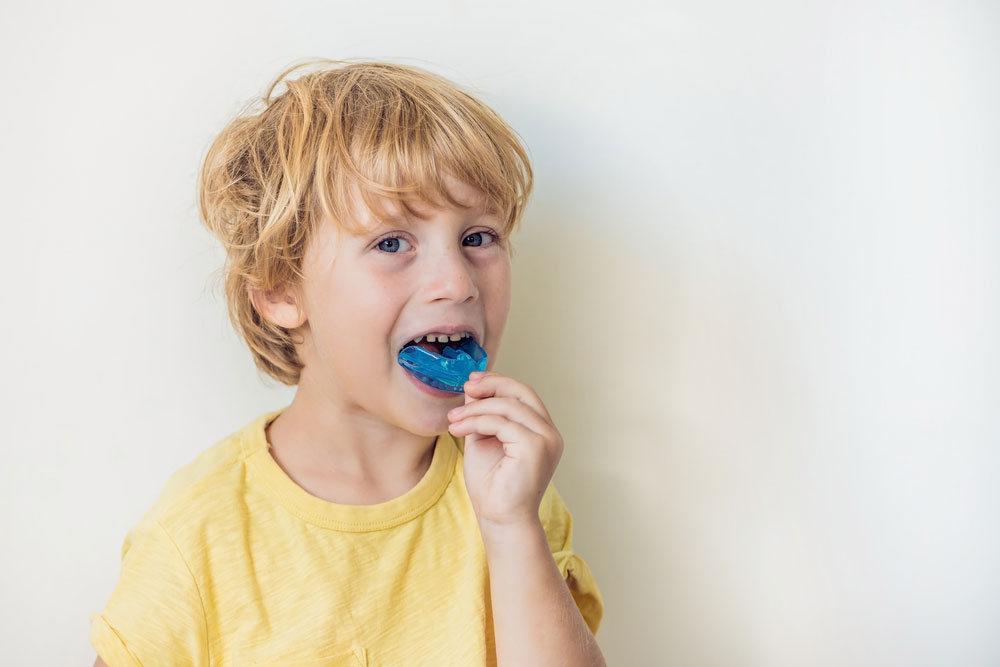
Ever heard of bruxism? You’re not alone. Even though it’s one of the most common kids’ oral health concerns we treat at Kids Mile High, it’s not a term that most of our Thornton, Central Park and Englewood pediatric dentistry patients are familiar with. You probably know it better by it’s non-technical name: teeth grinding. While it can be cause for concern in some cases, it’s a totally normal part of childhood that typically resolves itself on its own.
Taking care of your little ones’ teeth is our number one priority at Kids Mile High, from infancy all the way through adolescence. We know that navigating your child’s oral health can be confusing at best. If you’re hearing grinding noises from your child’s bedroom at night, it can be downright scary! Unfortunately, there can be long-term effects of bruxism if left untreated and it may also be a sign of a bigger issue. Here, we’re breaking down everything you need to know about teeth grinding in children and what to do about it.
Table of Contents
Why Do Children Grind Their Teeth?
If your child is grinding his or her teeth, you might be wondering why it’s happening in the first place. The exact cause of teeth grinding in children is unknown, but most experts agree that it’s a response to tooth discomfort due to normal oral development, such as emerging or misaligned teeth. If the cause of tooth grinding is developmental, kids will usually stop on their own once all of their adult teeth come in.
Sometimes, though, teeth grinding has nothing to do with tooth development. When teeth grinding is ongoing, it may be caused by emotional upset, such as stress or anxiety. Believe it or not, children deal with a lot of stress in their young lives, from school pressure like getting good grades and making friends, to changes at home like moving or a death in the family. Children thrive in routines and any major changes can lead to physical reactions — including bruxism.
Additional causes of teeth grinding include reactions to medications, hyperactivity, being tongue tied, or medical conditions such as cerebral palsy.
Effects of Teeth Grinding
Many parents never even know their kids are grinding their teeth. That doesn’t make you a bad parent! Bruxism usually goes away on its own, so you may never have the chance to worry about it! If you know your child is grinding his or her teeth, you’re probably concerned about the effects of bruxism for your child’s oral health.
Some children may experience temporary symptoms, such as headaches or earaches, but these typically go away when tooth grinding stops. For children who continue to grind their teeth, you may see some more serious side effects, such as damage to tooth enamel, chipped teeth, increased temperature sensitivity, facial pain, or jaw issues.
Teeth Grinding: What to Look Out For
The most important thing to remember about teeth grinding in children is that it is generally not something you need to worry about. It’s a normal part of childhood oral development that should resolve itself eventually. That said, there are always exceptions. Teeth grinding isn’t good for your child’s teeth and can cause wear and tear in the long run. Asking yourself, “Is my child grinding her teeth?” Here’s how to tell if your child has bruxism.
- Grinding noises while your child is sleeping
- Complaints of a sore jaw
- Changes in eating habits or discomfort with chewing
- Chipped teeth
- Behavioral changes
Any combination of these symptoms can be a sign that your child is grinding his or her teeth. As we’ve mentioned, kids usually outgrow this habit on their own but if you notice that it’s not going away, err on the side of caution and contact your Central Park, Englewood or Thornton pediatric dentist.
How to Treat Children’s Teeth Grinding
We’ve said it once and we’ll say it again: children usually stop grinding their teeth on their own. But simply waiting for teeth grinding to go away can be somewhat stressful for parents. How long does it take for kids to stop grinding their teeth? When is it time to see a pediatric dentist for bruxism? While intervention for bruxism is not usually required, a pediatric dentist like the doctors at Kids Mile High can give you the guidance and reassurance you and your child need.
Even for mild cases of bruxism, having a pediatric dentist keep an eye on your child’s development can ensure teeth grinding isn’t interfering with their oral health. If your child is experiencing facial or jaw pain from teeth grinding, we recommend getting a special mouthguard for your child to wear while sleeping. A custom-made night guard can help prevent teeth grinding quickly, effectively and for the long-term.
But what about treating teeth grinding that’s caused by stress or anxiety? This can be a little more difficult and treatment starts at home. Talk to your child about what’s upsetting them and encourage them to open up about what’s triggering their anxieties. Once you know why your child is upset, you can help them develop healthy strategies for coping with stress. In the interim, it may be helpful to schedule a consultation with one of our pediatric dentists to determine if they would recommend an occlusal guard to help protect the teeth from damage.
Does your child grind his or her teeth? Worried that your child’s bruxism isn’t going away? Kids Mile High is here to answer any questions you have about teeth grinding in children. Call us to book a free consultation and help your child overcome their bruxism today.



